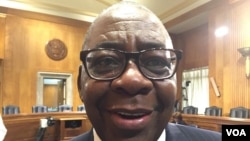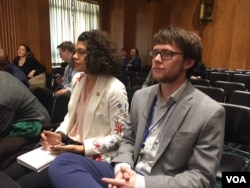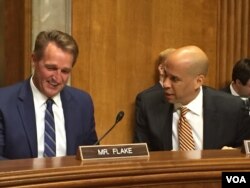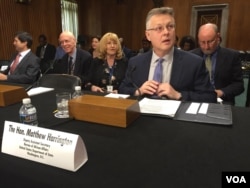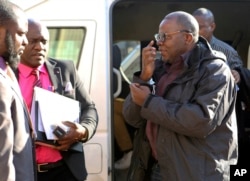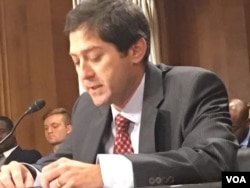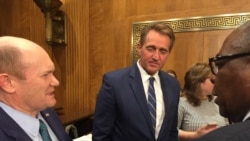A Zimbabwean businessman has suggested that the American government should remove targeted sanctions imposed on some leaders of the ruling Zanu PF party, saying the restrictive measures are hurting businesses and common people.
The call was made by Joseph Mutizwa, founder and chief executive officer of Pathways Africa, when he appeared a few days ago before the United States Senate Foreign Relations Committee chaired by outgoing Arizona Senator Jeff Flake.
Mutizwa told the Subcommittee on Africa and Global Health Policy, discussing the political and economic situation in Zimbabwe following the country’s July 30 harmonized elections, that the sanctions are impeding economic growth in the southern African nation.
“Number one hurdle of course is the sanctions, the sanctions are real. We hear talk that they are targeted sanctions, but the impact, the net impact of the sanctions on the economy of Zimbabwe is large. We are aware of course of the country risk, which is associated with the negative image that is painted because of the sanctions.”
He said most businesses are unable to access lines of credit due to the sanctions.
“Sanctions actually have a very fundamental impact on our businesses that we cannot access affordable lines of credit, that the country perceptive is very negative, that there are a lot of institutions dis-risking out of Zimbabwe, corresponding banks terminating relationships with Zimbabwean banks. So, we see the impact of sanctions as much wider.”
But Senators Chris Coons, Cory Booker and Jeff Flake together with Matthew Harrington, Deputy Assistant Secretary of the Bureau of African Affairs in the United States Department of State, said indications are that there is a lot of talk and little action on fundamental reforms being implemented by President Emmerson Mnangagwa’s government.
Coons said not much has been done in Zimbabwe to have the targeted sanctions lifted by the USA and other nations.
“I would like nothing more than to see the reforms in Zimbabwe that would support then our lifting all the restraints and to see Zimbabwe back to being an open and healthy economy.”
Coons added that President Mnangagwa is talking a lot without taking the necessary action to make Zimbabwe a democratic nation.
If you read out transcript with President Mnangagwa, if you read transcripts of his speeches, if you read the editorial he wrote in the New York Times, he is saying all the right things. Our challenge is the doing. I would agree with you that sanctions have an impact but I would agree with Dr. Moss that there a whole series of things that the government should and can do to move towards an economy that is genuinely the sort that investors would be attracted to.”
His sentiments were echoed by Senator Flake, who said Mnangagwa’s government should drop charges against opposition leader Tendai Biti, accused of allegedly urging opposition supporters to reject presidential election results if they were not won by the Movement for Democratic Alliance led by Nelson Chamisa.
“It will be difficult to move forward with any type of relationship with Zimbabwe, to progress on some of these issues while charges are still levelled against him and he is not allowed to travel freely as his passport has been revoked, I believe.”
Todd Moss, senior fellow of the Center for Global Development, expressed similar sentiments, saying Mnangagwa’s government is almost the same as that of former president Robert Mugabe, who was toppled in military intervention last November.
“Mugabe may be gone yet the government is still the same old actors. The government says the country should move on yet there has been no genuine attempt to deal with past atrocities … We have has plenty of rhetoric on democracy, national reconciliation and economic reform and while we can point to a few gestures very little if any meaningful change has occurred. First on the election, the electoral commission was very far from being independent, as in the past Zanu PF and security forces used intimidation and violence to influence votes. The military was openly and deeply involved in the election. The ruling party even weaponized food aid for votes.”
Harrington, who represented the United States government in the Senate hearing, expressed concern over the slow pace of political and economic reforms in Zimbabwe.
“We are seeing some positive changes on the tone and the rhetoric side, we are not seeing a whole lot of action. I think we have a way to go until we will be comfortable to come to the table and making a case for any kind of debt relief of any kind of lending.”
The United States and its allies imposed targeted sanctions on Mugabe and his inner circle over claims of vote rigging and human rights abuses.




